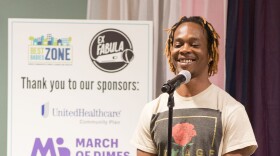COVID-19 has implemented immediate challenges to our health care system and the health of the country. And these immediate and long-term changes pose an exponential risk to those with addiction.
Social distancing, working and teaching children from home, unemployment — all of those can be a triggering stressor for those in recovery. Spending more time at home could dramatically increase relapse rates, especially as access to recovery care is limited or changed.
>>Latest WUWM & NPR Coronavirus Coverage
Organizations are still working hard to be there for those struggling with addiction during the coronavirus pandemic. Many Alcoholics Anonymous meetings and other programming are moved to virtual platforms, and communication and outreach are more important than ever.
"[Coronavirus has] definitely made a shift in our approach," notes Jessica Brownrigg, a certified peer specialist through Vista Care and a recovery coach through the Wisconsin Recovery Community Organization (WIRCO) based in Sheboygan. "I believe people can still maintain that long-term recovery by offering some creative solutions ... The biggest thing that helps, I think, someone stay in recovery is helping others or sharing with others."
Fortunately, Brownrigg says there hasn't been a significant number of people getting into recovery during this period who don't already have previous in-person experiences in group meetings, which helps with encouraging engagement on different platforms.
Brownrigg admits she was skeptical whether a virtual group meeting would have the same level of connection as the in-person meetings, but she says it's been incredibly helpful.
"Some of the people that I've worked with who are newer are a little shy from going into the rooms, so this is actually something that's a better offer for them because they can just go on a phone and listen in," Brownrigg notes.
While virtual meetings are widely available, access to medications for addiction treatment is limited to help avoid spreading the coronavirus at treatment centers. This has attributed to a rise in opioid use and overdoses across Wisconsin.
"There's definitely been a spike in opioid use and overdoses," notes Aaron Clayborn, a recovery coach and a WIRCO supervisor. He says the opioid use and overdose rate in Milwaukee County is expected to increase by up to 50% from 2019-2020. Just this past weekend 13 people in Milwaukee died from an overdose, according to the county medical examiner.
"Individuals who are seeking help — they feel like they have nowhere to go and no one to turn to. We just want to keep pushing the word that the help is there. We're not going anywhere." - Aaron Clayborn, WIRCO supervisor
"It's very important to get the word out so we can prevent this," says Clayborn. "Those individuals who are seeking help — they feel like they have nowhere to go and no one to turn to. We just want to keep pushing the word that the help is there. We're not going anywhere."
Some facilities are still admitting people across the state if someone is in the first 30 days of recovery or in crisis — just with the proper health precautions. Brownrigg encourages checking with facilities in your area to see what in-person options remain.
"It's great and a beautiful thing to see that we're still providing some support and doing everything that we can to keep these people connected and getting them to where they need to be," she says.
Tips to help stay in recovery
- Maintain a daily schedule, even if you are laid off or unemployed.
- Have a daily check-in with a coach, certified peer specialist, sponsor or group.
- Exercise regularly, get outside, and maintain a healthy diet.
- "The simple things make a huge difference," says Clayborn.
Additional resources
Clayborn says people should take advantage of the wide array of recovery options available during the coronavirus. "Reach out to any organization that you look up," he says. "There’s plenty of rooms and plenty of conversations — recovery is universal, it’s not just limited to your area."
Here are some recovery resources:
General
- Jackie Nitschke Center
- Rogers Behavioral Health
- Substance Abuse and Mental Health Services Administration
Manitowoc
Milwaukee/Madison
- Wisconsin Voices for Recovery
- Metro Milwaukee Narcotics Anonymous
- Alcoholics Anonymous Milwaukee
- WisHope
- JustListen
Northeast Wisconsin (Green Bay area)
Sheboygan
- Wisconsin Recovery Community Organization
- Mental Health America
- Sheboygan Mobile Crisis: 920-459-3151






